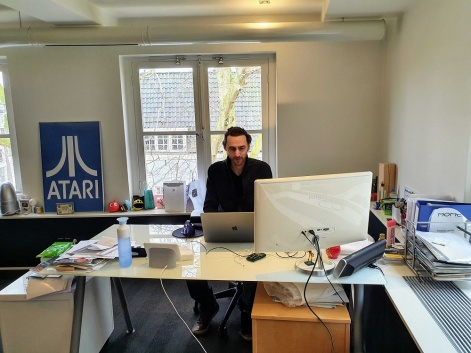The games industry plays host to a colourful cast of diverse individuals, from artists and coders to narrative designers and studio heads.
The skills to pull off these roles, however, are complex and differing, with each position requiring mastery in its field – especially in these complex times we are all living through at the minute.
To highlight some of the brilliant work that goes on behind the scenes as well as how employees around the world are adapting to the life of remote work, PocketGamer.biz is reaching out to the individuals who make up the games industry in our Jobs in Games: Remote Working series.
This week we spoke with CoolGames technical lead Kasper Boonstra.
PocketGamer.biz: Can you tell us about your current role and what it entails?
Kasper Boonstra: I am the technical lead at CoolGames, where I manage our tech team, focus on its strategic direction and look to improve processes.
How did you first get into games and how did you progress into this role?
One thing I knew for sure growing up is that I would not end up in an office job. I wanted to work with people first and foremost, studying social work initially because I wanted to understand the problems people face and create strategies to prevent them from recurring.
Working remotely felt like a bigger issue than it turned out to be, with the biggest change being in communication.Kasper Boonstra
In my spare time, I liked to program and everything I made eventually turned into a game. The people I surrounded myself with couldn't care less about programming and games so I always felt different but one day a friend invited me to a hackathon and it was there that I realised these are my people.
While we were 'hacking' a developer asked about my background and that the company was hiring. I was so happy someone finally expressed interest in my games that I showed them everything I made. I never thought you could get into games or programming this way, so I applied the next day and they hired me on the spot.
What did you study (if anything) to get your role? What courses would you advise for aspiring professionals in the area?
There is a lot more to becoming a good programmer than programming itself. Social work has helped me a lot in my career - teaching me how to lead meetings, ask good questions and get people to talk with you. These are the traits I look for when I hire
An average programmer with good communication and social skills is easier to train. Often they are a better fit than a superstar with an attitude problem.
Do you think there are any misconceptions, public or professional, surrounding your area of expertise?
People outside of work often expect you to know your way around computers and because of that programmers learn how to do it by helping others. Secondly, if you like playing games that does not mean you like making games. Game programming can have very little to do with the game itself.
Professionally, what I notice is that people believe you only need a good game idea to be successful. Hit games don’t come from just a great idea. It comes from careful planning and crucial judgments based on analytics in areas such as drop off and load times or price points.
For over 10 years, we have been hosting our games on different platforms and they measure the performance of your game at all times. The games we have on Facebook are measured differently than the ones we host on Snap. We want to be featured at the top spot by these partners. To reach that we need to measure the same way they do and repeatedly iterate.
What advice do you have for someone looking for a job in this profession?
You need sufficient knowledge and experience to get a job in games. What’s really important is to own your own skills and expertise. Put yourself out there. Show your work, passion and enthusiasm.
How has the shift from office to remote working impacted your role, if at all?
Working remotely felt like a bigger issue than it turned out to be, with the biggest change being in communication.
Just after we started working remotely we were chosen by Google to develop voice-controlled games, such as Horizontal Crosswords. Making those games requires developers to talk to their devices.
The biggest disadvantage is the isolation and the psychological challenges of being in your house all day.Kasper Boonstra
Imagine a whole team of developers in the same office space working on these games - it would be complete chaos. Even on conference calls if someone says: "Hey Google" all of our devices come to life. Working on these titles from home was exactly what we needed.
What does your typical day look like when working remotely?
I am still struggling to find a structure, originally envisioning that I would start my day with a short walk before answering emails. In reality, I wake up, briefly look out the window to see what the weather is like and immediately start working.
Around lunch, I try to have a short break, although I usually end up having meetings while I prepare and eat something in the kitchen. I generally work until my partner comes back from work. Then we cook, eat and put our work-life aside.
What do you think are the biggest advantages and disadvantages of remote working?
The biggest disadvantage is the isolation and the psychological challenges of being in your house all day. Some developers say they have no issues with being isolated for long periods of time but everyone has their limits. Making sure the team gets the right level of social interaction is something we need to manage as well.
The biggest advantages are with time and expenses related to travel, with myself previously travelling two hours per day. I immediately felt the benefit of the extra time once I started working from home.
Is there anything you wish you had known before moving to remote working?
That it’s not temporary, so it’s crucial to invest in quality chairs and webcams. Most importantly, take the time to talk with your teams.
Do you have any advice for others who are struggling to adjust to remote work?
Invest in a good working environment. Keep in contact with others. Experiment with food, exercise and structure. You need to find the balance that works for you. You have to be disciplined but it will help in the long run.

After the pandemic ends and if you were given the choice, would you prefer to continue working remotely or go back to working in an office?
I love both. I really miss the structure of travelling from home to the office. Travel helps a lot to separate work from home. On the other hand, I like sleeping an hour longer and cooking earlier as well. For me, the best scenario is where I work half the week at home and half the week in the office.





















